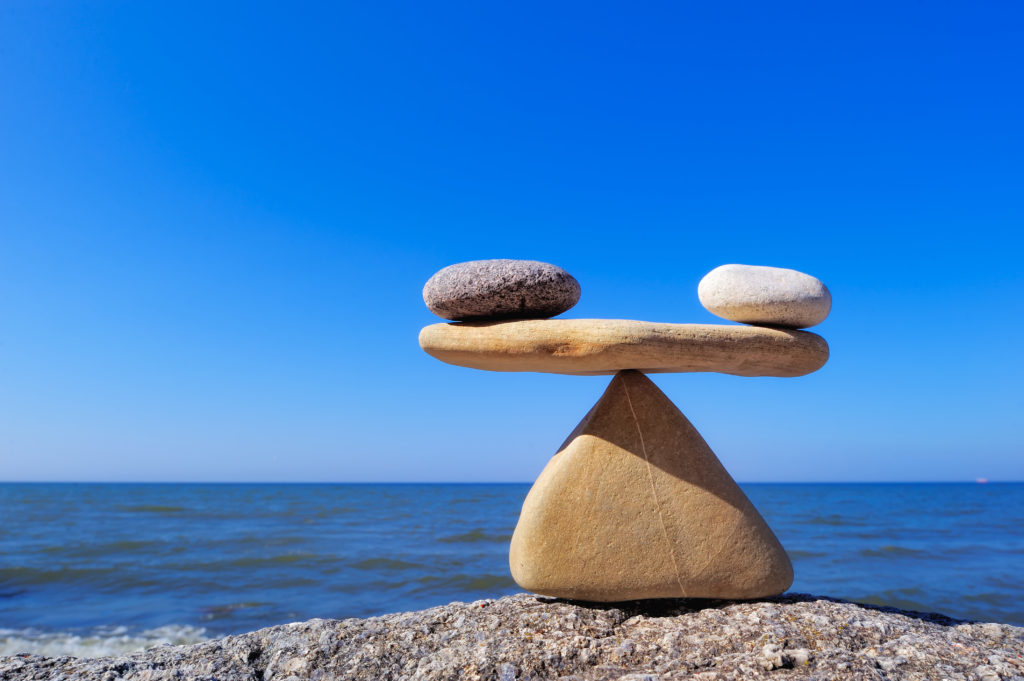
Symbol of scales is made of stones on the cliff
By Joanne Ahern. We all strive to be in balance, whether it be emotional, mental, spiritual, or physical. We read good books, are careful with what we watch on TV or the computer, spend time with the family, develop a relationship with the Lord, and exercise according to what is best for us. But is that enough? It seems that this is a lifetime of work, as it should be, but for today, let’s focus on the physical.
Whenever we speak of a balance problem, we are always told that it must be vertigo. I have found that vertigo has become a generic form for all balance problems when that is just not the case. Have you heard of BPPV (Benign Paroxysmal Positional Vertigo), Labyrinthitis, Meniere’s Disease, Vestibular neuronitis, Perilymph fistula, Mal de Debarquement? These are all forms of balance disorders. A doctor can determine which form is yours.
According to the National Institute for Health, a balance disorder is a condition that makes you feel unsteady or dizzy. If you are standing, sitting, or lying down, you might feel as if you are moving, spinning or floating. If you are walking, you might suddenly feel as if you are tipping over.
When you do go to the doctor, he or she will perform all the tests available to determine that your problem is not from some other illness. Some symptoms they may look for can include nausea and vomiting, diarrhea, changes in heart rate and blood pressure, and fear, anxiety, or panic. Sometimes simply changing a medication can solve the problem; however, symptoms may come and go over short time periods or last for a long time, and that can lead to fatigue and depression. Unfortunately, many balance disorders start suddenly and with no obvious cause.
At this point, consulting an Ear Nose Throat Specialist, or otolaryngologist, may be the next move.
The otolaryngologist may ask you to take a hearing examination, blood tests, an electronystagmogram (a test that measures eye movements and the muscles that control them), or imaging studies of your head and brain. Another possible test is called posturography. For this test, you stand on a special movable platform in front of a patterned screen. The doctor measures how your body responds to movement of the platform, the patterned screen, or both.
Experts believe that more than four out of 10 Americans, sometime in their lives, will experience an episode of dizziness or balance problem significant enough to send them to a doctor. Balance disorders can be caused by certain health conditions, medications or a problem in the inner ear or the brain. A balance disorder can profoundly impact daily activities and cause psychological and emotional hardship.
If you have a balance disorder, you may stagger when you try to walk, or teeter or fall when you try to stand up. You might experience other symptoms such as:
- Dizziness or vertigo (a spinning sensation)
- Falling or feeling as if you are going to fall
- Lightheadedness, faintness, or a floating sensation
- Blurred vision
- Confusion or disorientation.
For Older Adults, a great many falls occur as a result of dizziness or imbalance problems. If this is what you are dealing with, it’s time to call the doctor and get a diagnosis. Falls can lead to broken bones and even death.
You can go to Google and look up all the types of balance problems. Use the following keywords to help you find organizations that can answer questions and provide information on balance disorders:
- Balance
- Vertigo
- Dizziness
- Ménière’s disease
Joanne, who lives in Magnolia Estates, is the former Director of the North Mecklenburg Senior Center, affiliated with the Mecklenburg County Park and Rec Department. She can be reached at 980-314-1127.



